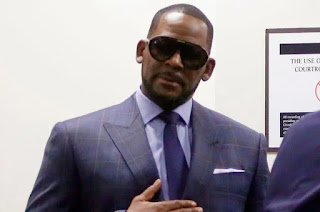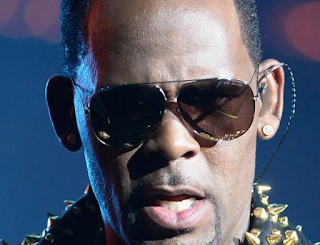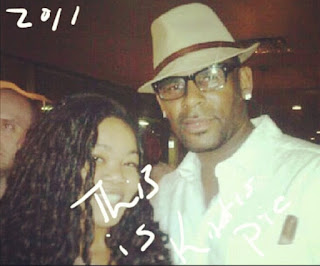I spent almost 20 years reporting on R. Kelly, and nine months trying to find an outlet to publish the story of the "sex cult" that would ― finally ― get the world's attention. (An excerpt from Soulless: The Case Against R. Kelly.)
Jim DeRogatis
BuzzFeed Contributor
June 5, 2019
The day before Thanksgiving, 2000, in response to a review I'd written as pop music critic at the Chicago Sun-Times about R. Kelly's then-current album "TP-2.Com," I received a fax. "Robert's problem," the anonymous correspondent wrote, "is young girls." The accusation had long been whispered on the local music scene, even before gossips said he married his 15-year-old protégé Aaliyah in 1994, and I initially tossed the letter in the slush pile of hate mail and press releases on the corner of my desk, eventually destined for the trash. But it gnawed at me through the long holiday weekend ― the letter had too many names, dates, and details to be mere rumor ― and on Monday, I began looking into the charges with the paper's legal affairs correspondent, Abdon Pallasch. After six weeks of grinding 14-hour days, we published the first story about the man I believe is the worst abuser in the history of popular music, which is saying something, given the art form's long and ignoble history of male stars mistreating women.
For 16 years, I never stopped reporting, taking the calls and emails from victims who said Kelly had never stopped hurting young women, even after he was acquitted on charges of making child pornography in 2008. On November 2, 2016, when I received an email from a mother in Georgia, I didn't sleep on it. At first, the story that Jonjelyn or "J." and her husband Tim Savage told me about their daughter Joy was hard to believe: Kelly was now effectively leading a sex cult, in total control of the lives of six young women in the Atlanta suburb of Johns Creek, they said. A second set of parents, Angelo and Alice Clary, soon told me the same story about their daughter Azriel, and I confirmed the information from these parents by talking to ten more sources, all of them on the record, and many providing extensive corroborating documentation.
Despite the evidence I compiled, the story about Kelly's cult proved more difficult to publish than any in my career, and that period provides a case study of the troubled state of journalism circa 2017. I worked at length with three news organizations, all of which provided additional reporting help, and I got far down the line with editing, fact-checking, and legal vetting at each before executives above the level of the editors I worked with decided not to publish. Desperate to bring their daughters Joy and Azriel home, the Savages and the Clarys contacted me several times a week throughout that long wait. They started to give up hope that the media would amplify their frustrated pleas for help. At times, so did I.
I spent a month doing my initial reporting after J. Savage first emailed me. Then I contacted Jessica Hopper, who'd interviewed me about R. Kelly's troubled history for the Village Voice. She had become executive editor at MTV News, and on December 6, 2016, she agreed to publish the story once we finished it. The broadcast channel had long since replaced music videos with reality-TV trash such as The Real World and 16 and Pregnant, but one of its rotating corporate regimes had decided to create a forum for long-form cultural journalism and criticism online. Eventually, Hopper hit roadblocks with the corporate overlords at Viacom Media Networks. They wanted to break the story in a half-hour documentary, and the legal department balked at indemnifying a freelance reporter.
"Every part of it had hit a snag that I wasn't positive I could untangle," Hopper later told me. "That's when I said, 'Go ahead and walk with it.' I felt horrible." She left MTV four months later.
Editor Jake Malooley had been asking me to contribute to the Chicago Reader, and his deputy Robin Amer had been a colleague at WBEZ. The alt-weekly had recently published a long investigative story about sexual harassment at the vaunted Profiles Theatre, shaking the Chicago theater scene. The Reader was owned at the time by Michael Ferro, a digital entrepreneur with a short attention span and grandiose visions who'd purchased the Sun-Times in 2011. Publisher and editor in chief Jim Kirk, a veteran of the Chicago Tribune, oversaw both papers, and the Sun-Times had of course published all of the original reporting about Kelly that I did with Pallasch.
I worked on the story with Amer from mid-February 2017 until early May. Maya Dukmasova contributed additional reporting, and the piece was vetted by media attorney who'd checked all of my original work, Damon Dunn. Then Kirk decided not to publish. "We felt at the time the story as turned in needed more sourcing," he later told me. He left the papers a few months later, not long before Ferro bought the Tribune as the controlling owner of a corporation he renamed Tronc, then he sold both the Sun-Times and the Reader. Those deals loomed in the background; my story was controversial, and controversy is bad for corporate dealings. Eventually, Ferro lost control of tronc and the Trib and put those up for sale, too, after sexual harassment allegations surfaced about him in March 2018.
From May through mid-July 2017, I worked with my colleagues at WBEZ to post the cult story on the website that hosted my blog of music news and criticism. Chicago Public Radio has a long, proud tradition of hard-hitting audio journalism ― local stories as well as pieces for This American Life, which originated at the station ― but it had never run a textual story so long, controversial, and complicated. Three editors worked with me through several more drafts, and Dunn vetted the story again. Early on July 11, Michael Lansu, as dogged a reporter as my old pal Pallasch, made the necessary calls seeking comment from Kelly's label, RCA/Sony Music, and his current lawyer, Chicago attorney Linda Mensch. We did not want them to know I was the primary reporter ― yet. Lansu outlined the damning allegations in the piece, set to post at noon on July 12. Executives at RCA/Sony Music declined to comment, but Mensch gave us a statement.
We can only wonder why folks would persist in defaming a great artist who loves his fans, works 24/7, and takes care of all of the people in his life. He works hard to become the best person and artist he can be. It is interesting that stories and tales debunked many years ago turn up when his goal is to stop the violence; put down the guns; and embrace peace and love. I suppose that is the price of fame. Like all of us, Mr. Kelly deserves a personal life. Please respect that.
Ultimately, Chicago Public Radio CEO Goli Sheikholeslami, whom I respect and admire, decided not to publish the story on WBEZ.org. "My recollection is we needed more time to further fact-check the story," she later told me, "but we were sensitive to your desire to publish swiftly based on concerns that you'd be scooped when some of your exclusive sources held a press conference. At that point, we mutually agreed that you would approach other media outlets with the piece. Once BuzzFeed agreed to work on the story, we were all glad it was able to get in front of a national audience."
Frustrated, as I was, with the difficulties of publishing the story after nine months of reporting, the Savages planned to call every news organization in Atlanta and camp out in front of the guest house in Johns Creek where Kelly kept the girls if that's what it took to get people to pay attention to their efforts to bring Joy home. I did not care about getting scooped. My immediate problem that Wednesday afternoon was that the Kelly camp knew what the story contained and that it would be published soon (I hoped). I worried that Joy and Azriel or their parents could face retaliation. I made two calls to editors I knew at the Chicago Tribune and the Los Angeles Times, both of whom said their papers could not move quickly with the piece, if at all.
I did not care about getting scooped...I worried that Joy and Azriel or their parents could face retaliation.
I generally avoided BuzzFeed's home page, but BuzzFeed News had been doing some of the most impressive journalism of the Trump era. Editor Shani Hilton and I had never talked, but I appreciated a story she and Aylin Zafar posted on the site in 2013 under the headline "R. Kelly's Alleged Sexual Assaults and Why No One's Talking About It." We connected Thursday morning, and BuzzFeed News wanted the story. I worked nonstop on final fact-checking and editing for the next four days with a brilliant editor, Marisa Carroll, and the same legal team that had worked on the site's blockbuster story about Christopher Steele's Trump-Russia dossier in January 2017. The story finally posted under the headline "Inside the Pied Piper of R&B's 'Cult'" at 7:02 a.m. on Monday, July 17.
As always, there is context. "Call it the Gawker effect," Washington Post media columnist Margaret Sullivan wrote a week after my story posted.
British journalist and digital entrepreneur Nick Denton had launched Gawker in 2002 as "the source for daily Manhattan media news and gossip," and he built a new-media empire as famous for its snark as its scoops. The company crashed in mid-2016 after a $140 million judgment in a suit brought by wrestler Hulk Hogan (real name Terry Bollea) when Gawker posted video of him having sex with a woman married to his friend Todd Clem, a radio host known as Bubba the Love Sponge. Silicon Valley billionaire Peter Thiel, a major donor to the campaign of a new president who'd bragged that his celebrity allowed him to "grab them by the pussy," bankrolled Hogan's legal action, allegedly aggrieved because one of Gawker's sister sites had mentioned his homosexuality. Absent malice in intentionally publishing a story a news organization knows to be untrue, American law makes it very difficult to libel public figures, but the new verdict from the federal court in Florida set a precedent that even household names can successfully sue for "an unreasonable invasion of privacy," a nebulous and dangerous new standard.
"Plenty of people were disgusted by Gawker's airing of the Hulk Hogan sex tape," Sullivan wrote in the Post, "and, as a result, not unhappy to see the site go out of business. But some of them would be less pleased to know that a story like the R. Kelly reporting ― or many others that we don't know about ― might never see the light of day. [Fear] can result in self-censorship at any stage of a story's development, maybe before it ever gets out of a reporter's notebook, or in the hour before planned publication."
My first BuzzFeed story did not name Joy Savage or Azriel Clary, because we considered them victims of sexual abuse, and it did not name their parents, because naming them would identify their daughters. Numerous sources confirmed the identities of the four other women who until recently had been living with Kelly, but we did not name them, either. We described the other members of the cult only as a 19-year-old model; a 31-year-old "den mother" who "trained" newcomers on Kelly's rules and how he liked to be pleasured sexually; a 25-year-old woman who had been part of the singer's circle for seven years ― Dominique Gardner would later go public ― and an Atlanta songwriter, a woman whom Kelly's personal assistant Cheryl Mack had represented and introduced to the star.
Later the day the story published, Tim and J. Savage spoke to the media outside one of the two homes Kelly rented in Johns Creek. Asante McGee joined them; she had been named in the story, along with Kitti Jones and Mack. (It was the first time McGee and Jones told their stories.) Angelo and Alice Clary did not go public until several months later.
BuzzFeed charted more than six hundred "media pick-ups," online and in print, and I did more than 40 print and broadcast interviews in the first week after publication.
In stark contrast to the first Kelly story that Pallasch and I published in the dead-tree Sun-Times in December 2000 ― a dramatically different era ― the cult story instantly spread far and wide thanks to social media. BuzzFeed charted more than six hundred "media pick-ups," online and in print, and I did more than 40 print and broadcast interviews in the first week after publication. I kept talking because I wanted people to care about Joy and Azriel.
As I prepared to go live with Canadian public broadcasting from a studio at WBEZ two days after the story ran, my phone rang. My stepfather, Harry Reynolds, had been struggling with Alzheimer's in a specialized care facility. He died shortly before the scheduled start of my interview with CBC Radio. I thought about canceling it and all the others scheduled for the next two days, but I'd made Harry's arrangements in advance. My brother called our mom, and my wife and daughter sat with her until I finally got there that evening.
My stepdad had spent the last 30 years of his career working with students just a little younger than Joy and Azriel in the public schools of some of the poorest neighborhoods in Jersey City. He had been the kind of teacher who'd take off his tie and give it to a boy to wear to the science fair, and who'd pass his lunch to a girl who didn't have one. The pain Kelly had caused so many girls for so long had grabbed the spotlight. I thought that talking about it was exactly what Harry would have wanted me to do, and I hoped I did him proud.
I also kept reporting. Six weeks later, BuzzFeed News published my story about Jerhonda Pace, née Johnson, a teenager Kelly met during his trial, and seduced a short time later at his mansion in Olympia Fields. (She is one of four victims in the ten-count indictment for sexual assault announced by the state of Illinois in February 2019.) In the spring of 2018, Lizzette Martinez spoke publicly to me for the first time about her underage relationship with Kelly and the miscarriage she endured alone in a Chicago hotel room when she was a teenager. That story also quoted Chicagoan Michelle Kramer; she said her daughter had been part of Kelly's cult since she and her best friend, Jerhonda, partied at Kelly's mansion in 2009. We did not name Kramer's daughter Dominique Gardner, but her mother later did. "Being silent is not the answer, so I said, 'It's time,'" Kramer told me. "I want my child home. I don't know what hold he has on her, but her last words to me was, 'Don't ever give up on me.'"
Although they often felt isolated and ignored, activists had never given up on protesting Kelly's predatory behavior. Launched two weeks after the BuzzFeed "cult" story in the summer of 2017 by Kenyette Tisha Barnes and Oronike Odeleye, a new crusade called #MuteRKelly succeeded in forcing the cancellation of eleven of his concerts over its first fifteen months. Their goal was to stop Kelly from hurting women by shutting down the income that had enabled him, stopping his ability to record or perform. In May 2018, Time's Up, the movement formed by Hollywood celebrities to fight sexual harassment in the wake of allegations about Harvey Weinstein, joined Barnes and Odeleye to release a strongly worded statement supported by, among others, directors Ava DuVernay and Shonda Rhimes, musicians John Legend and Questlove, and Tarana Burke, who had founded #MeToo in 2006.
"As women of color within Time's Up, we recognize that we have a responsibility to help right this wrong," the women in the organization wrote, and they demanded action by industry enablers such as RCA/Sony Music, Live Nation/Ticketmaster, Spotify, and Apple Music. They also called for criminal investigations.
"Kelly's music is a part of American and African-American culture that should never ― and will never ― be silenced," Kelly's camp fired back. No one working for the star put their name to the statement; his latest spokeswoman, Trevian Kutti, had recently resigned. "Since America was born, black men and women have been lynched for having sex or for being accused of it. We will vigorously resist this attempted public lynching of a black man who has made extraordinary contributions to our culture."
A new crusade called #MuteRKelly succeeded in forcing the cancellation of eleven of his concerts over its first fifteen months.
Some close to Kelly whispered to reporters that the girls he housed were runaways eager to escape difficult home lives, and the singer simply took pity on them. Those who left and spoke out against him were either jealous or looking for a payoff. I'd heard these arguments on occasion since late 2000, and it was impossible to believe that so many women had been lying about so many things for so much time. Kelly's critics certainly didn't buy that.
"It's going to take the black community to fully embrace the idea of R. Kelly being a predator, and to understand that even if the girls are now 21 or 18, it's still predatory behavior and that he shouldn't be celebrated in our community," Tarana Burke told me for another piece I wrote for BuzzFeed News in the spring of 2018. The problem, Barnes added, is that people "don't give a damn about black girls," the majority of Kelly's alleged victims. "The bottom line is that R. Kelly ... is the greatest example of a predator in that he went after the most vulnerable that no one cares about."
By the end of 2018, the FBI and local law enforcement agencies in suburban Atlanta, Chicago, Olympia Fields, and Polk County, Florida, still hadn't acted, despite hours of interviews with the parents and others in my stories, and seven complaints the Savages, the Clarys, and Jerhonda had filed against Kelly since 2016. Joy Savage released two videos through the Kelly camp's favorite pipeline, TMZ, claiming she was fine. In the second, Dominique Gardner appeared at her side. Dominique would not go public about her nine years in what everyone now calls "the cult" until March 2019, the same time Azriel Clary first spoke publicly in an interview with Gayle King on CBS This Morning.
After the first BuzzFeed News story, I received many inquiries about working with proposed documentaries; all of them wanted to be the next Making a Murderer or The Jinx. The producers of Lifetime's Surviving R. Kelly, Bunim/Murray, pursued me the most aggressively, but I declined for two reasons. BuzzFeed wanted to make a film, and given the support the organization had shown me, I didn't want to work with anyone else at the time. Bunim/Murray also were the schlockmeisters behind The Real Worldand Keeping Up with the Kardashians, and I saw the blurring of reality and entertainment and the pursuit of celebrity über alles as part of the cultural disease that enabled Kelly. dream hampton was not yet connected with the project, and I had no confidence Bunim/Murray would do journalism, not sensationalism.
In the end, dream and her team contributed something enormously important with Surviving R. Kelly, which ran during the first week of a new year, 2019, and which broke viewership records for Lifetime. For nearly two decades, I had talked with women who told me how Kelly had abused them, and I'd interviewed most of the people who appeared in the series (including the former Kelly assistant shown in silhouette with an altered voice, one of two who held that position after Cheryl Mack). Thanks to dream, for six hours, viewers saw and heard these women speaking directly to them, and it made a difference.
When I was writing the first Sun-Times story in December 2000, the recent issue of Vibe magazine with dream's cover story about Kelly sat on my desk. About two months earlier, she'd spent several days in Chicago with the singer, waiting in and around the recording studio for him to grant her an interview. Talking to Jessica Goldstein of ThinkProgress in 2019, dream said she hadn't thought about the ages of the young women she saw hovering around Kelly until a month or two later, when the first Sun-Times story came out. "Not only did I immediately realize, 'Wow, I missed the whole story,' it's like being at Jeffrey Dahmer's house and being like, 'Fuck, I should've opened this fridge.'" In early 2019, more people than ever finally opened the door.
Adapted excerpt from the new book Soulless: The Case Against R. Kelly (Abrams Press) by Jim DeRogatis, available now; © 2019 Jim DeRogatis.
Jim DeRogatis is an associate professor of instruction at Columbia College Chicago and the host, with Greg Kot, of the nationally syndicated public radio show Sound Opinions. The author of Let It Blurt: The Life and Times of Lester Bangs and other books, he spent 15 years as the pop music critic at the Chicago Sun-Times. He lives in Chicago.
https://www.buzzfeednews.com/article/jimderogatis/i-thought-the-world-would-never-know-about-r-kelly









